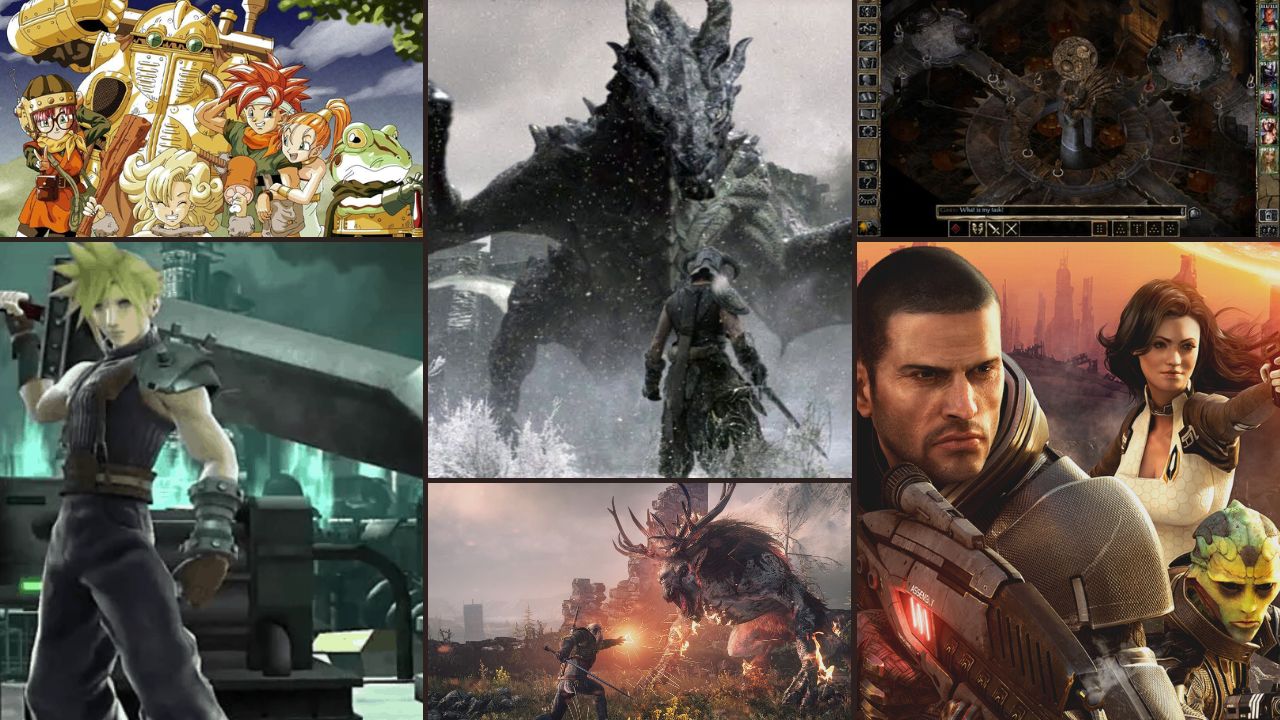Role-playing games (RPGs) have been a cornerstone of the video game industry for decades, captivating players with immersive stories, memorable characters, and complex gameplay mechanics. In this article, we’ll take a closer look at these 10 top RPGs and delve deeper into how each game made a lasting impact on the gaming industry.
Chrono Trigger (1995) – SNES
Chrono Trigger, developed by a collaboration of renowned RPG creators, established new heights for storytelling with its time-traveling plot and multiple endings. Its innovative Active Time Battle system, which combined turn-based and real-time mechanics, introduced a fresh approach to combat that was adopted by many future RPGs. Additionally, its distinct art style, created by Dragon Ball’s Akira Toriyama, contributed to its lasting appeal. Be sure to learn more about how Chrono Trigger truly impacted the gaming industry in our in-depth article.
A screenshot from The Elder Scrolls V: Skyrim, one of the best video games of 2011.
The Elder Scrolls V: Skyrim (2011) – Multiple Platforms
Skyrim pushed the boundaries of open-world RPGs with its vast, intricately detailed world and rich lore. Its radiant quest system, which generated endless side quests, offered an unprecedented level of freedom to players. Furthermore, its extensive modding support created a thriving community that continues to produce new content, inspiring game developers to support and embrace modding in their own titles. If you want more, check out our detailed article on how Skyrim changed gaming forever.
The Witcher 3: Wild Hunt (2015) – Multiple Platforms
The Witcher 3 redefined narrative depth and choice-driven storytelling in RPGs. Its morally complex quests and branching storylines allowed players to shape the world in a meaningful way, while its vast open-world setting raised the bar for environmental design. The Witcher 3’s impact can be seen in subsequent RPGs that prioritize player agency and deep, engaging storylines.
Final Fantasy VII (1997) – PlayStation
Final Fantasy VII’s groundbreaking 3D graphics, cinematic cutscenes, and emotionally charged story made it a standout title that expanded the RPG audience. Its materia system, which allowed players to customize character abilities by equipping magical orbs, introduced a new layer of strategic depth that influenced character progression systems in future RPGs.
Mass Effect 2 (2010) – Multiple Platforms
Mass Effect 2 built upon the foundation of its predecessor, taking player choice and consequence to new heights. Its deep character interactions, branching storylines, and the ability to import decisions from the first game created a truly personalized experience. Many RPGs have since adopted similar mechanics, emphasizing the importance of player choice and its impact on the narrative.
Baldur’s Gate II: Shadows of Amn (2000) – PC
Baldur’s Gate II refined the isometric RPG genre, offering players a richly detailed world, memorable characters, and an expansive narrative. Its blend of real-time strategy and pause-based tactical combat set the standard for countless RPGs that followed, including the highly acclaimed Pillars of Eternity and Divinity: Original Sin series.
EarthBound (1994) – SNES
EarthBound challenged RPG conventions with its quirky humor, modern setting, and unique gameplay elements. Its innovative inventory management system and “rolling HP meter” combat mechanic influenced future games like Undertale and Lisa: The Painful RPG. EarthBound’s offbeat charm and distinctive mechanics continue to inspire indie RPG developers today.
The Legend of Zelda: Breath of the Wild (2017) – Nintendo Switch, Wii U
Breath of the Wild broke new ground in open-world design, offering deep exploration and creative puzzle-solving mechanics. Its emphasis on freedom of exploration and non-linear gameplay has become a benchmark for open-world games, with recent RPGs like Genshin Impact and Immortals Fenyx Rising adopting similar approaches. While not a traditional RPG, Breath of the Wild’s influence can be seen in the genre’s shift toward player-driven exploration and experimentation.
Diablo II (2000) – PC
Diablo II took the action RPG formula to new heights with its fast-paced combat, randomized loot, and addictive multiplayer. Its impact can be seen in the emergence of an entire subgenre of RPGs, including hack-and-slash titles like Path of Exile, Torchlight, and the popular MMORPG World of Warcraft, which was also developed by Blizzard Entertainment. Diablo II’s loot-driven gameplay and endless character progression continue to shape action RPGs today.
Dark Souls (2011) – Multiple Platforms
Dark Souls is known for its challenging gameplay, interconnected world design, and deep, cryptic lore. Its punishing difficulty, innovative online mechanics, and unique approach to storytelling have inspired a host of “Souls-like” games that adopt its core principles. Titles such as Bloodborne, Sekiro: Shadows Die Twice, and Nioh all draw from the Dark Souls formula, proving the game’s lasting impact on the RPG genre.
Top RPGs That Defined Their Era
These top 10 RPGs not only provided countless hours of entertainment for gamers but also left lasting impressions on the gaming industry. Each game brought unique innovations and memorable experiences that shaped the RPG genre and continue to influence game developers today. As the industry evolves, these timeless classics will be remembered for their groundbreaking contributions and the unforgettable adventures they offered to players around the world.
